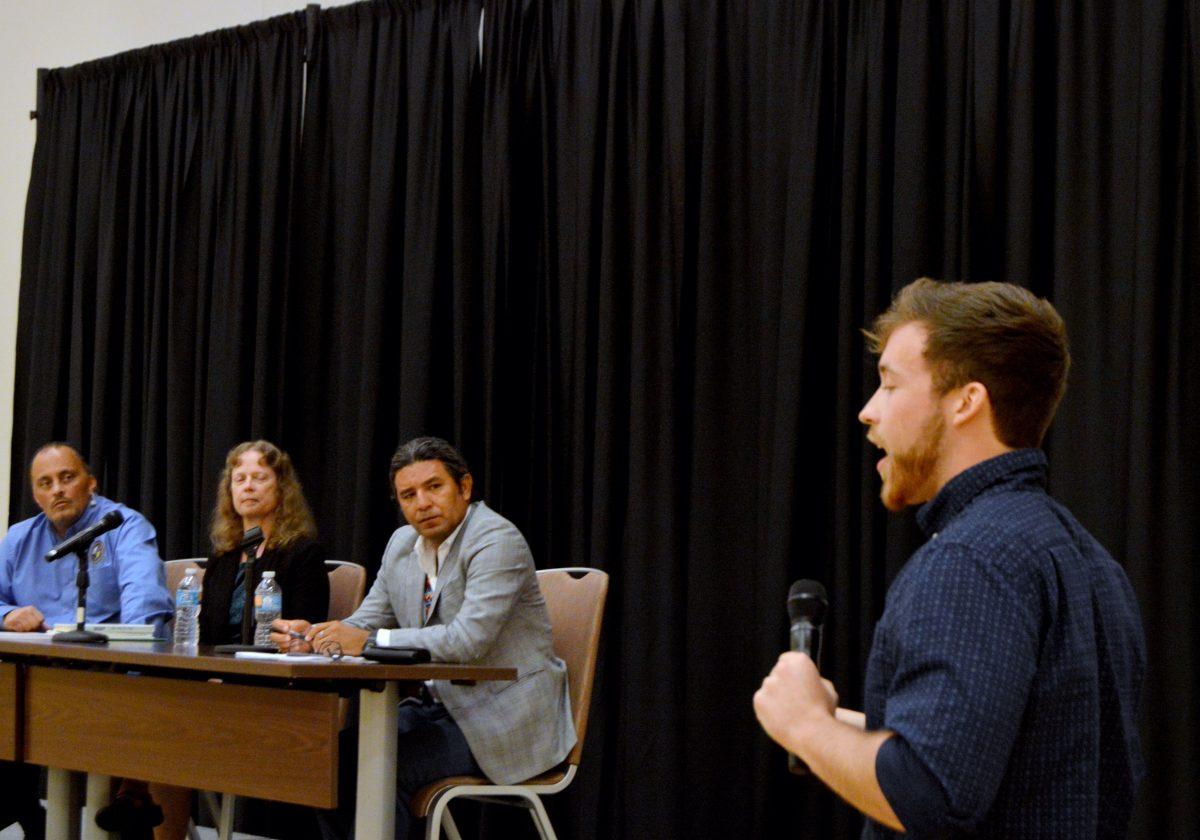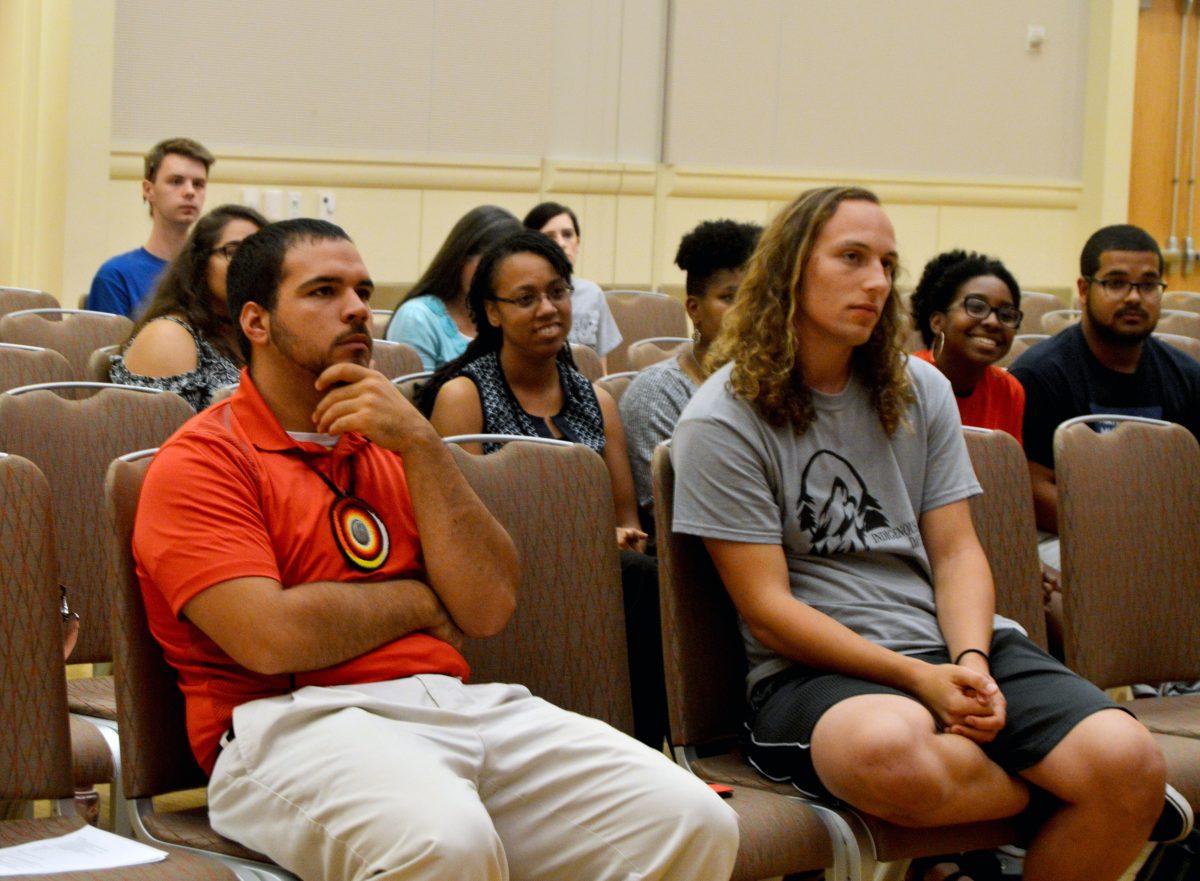Concluding the third annual Indigenous Peoples’ Day festivities, community members gathered in Talley Student Union for a panel discussing what it means to be indigenous.
The panelists included Frank Cooper, a professor of American Indian studies at Hoke County High School; Gabrielle Vail, an adjunct professor of anthropology at UNC-Chapel Hill; and Emilio del Valle Escalante, a Guatemalan/Maya K’iche’ professor and indigenous literature researcher at UNC-CH.
Part of the panel discussion focused on what knowledge people should consider about Columbus with respect to his history in the Americas, in lieu of his federal holiday. Cooper addressed the point, citing Columbus’s diaries.
“If people understood the history of Columbus … then they would understand why Columbus Day should not be celebrated in this country,” Cooper said. “This man, the first thing that he did was select 1,500 people to send back to Spain as slaves. He used 9 and 10-year-old little girls to pay his men to run the [plantation] that they had in Hispañola, fed people to dogs… it just goes on and on.”
The panel began with singing and drumming from the Miskwa Waya drum group, followed by discussion. The majority of the discussion centered on the state of indigenous peoples in North Carolina, as well as around the Americas, as well as the purpose of Indigenous Peoples’ Day in light of the federal holiday, Columbus Day.
Indigenous Peoples’ Day began at NC State in 2015 with the Student Senate passing the Indigenous Peoples’ Day Celebration Act, also known as resolution 42. Under the act, students expressed support for a day formally acknowledging the experiences of the peoples native to the Americas in place of Columbus Day.
The panel acknowledged the incredible diversity among indigenous peoples in the Americas, citing the various types of Native American tribes living in North Carolina among others, for example. Speaking with respect to Columbus Day, del Valle Escalante examined the effect of Columbus’s expeditions on the diversity among indigenous peoples.
“According to an ethnologue, which is a linguistic database that reports how many languages are spoken, there are 1,061 native languages that are spoken in the Americas,” del Valle Escalante said. “Let that stick in your head… and the power of Columbus, by sticking us in a box with the word ‘Indian,’ and then slowly, all of that diversity disappear …. The fact that we are first nations in this atmosphere and don’t know about this, that should make us angry, right?”
Miguel Ortiz-Cruz, a second-year studying technology, engineering and design education, recounted his experiences with his native language, Mixteco, as a child and how it shapes his indigenous identity.
“I was speaking, and the teacher approached me and asked if they could speak to my mother,” Ortiz-Cruz said. “She said [to my mom] ‘we don’t want your son speaking his native language because it will hinder him learning English.’ The damage that that has done in my identity is a lot. … I am a more complex character than just Mexican.”
Vice Provost of Institutional Equity and Diversity Linda McCabe Smith addressed the audience alongside the panel, citing NC State’s record high graduation rates among Native American students as well as leadership in cultivating Native American graduates.
“I can probably sit up here and give you three or four paragraphs of whatever, but we need to do better than what we are doing,” McCabe Smith said. “… As you know, our work is never done. We must continue to make improvements in inclusivity… we would like to see more representation of native students, staff and faculty at NC State.”
Cooper concluded, calling the audience to treat Indigenous Peoples’ Day as more than a holiday, but rather, a call for activism in supporting indigenous cultures and communities.
“The Native American population in North Carolina is growing, and we already have the highest population on the east coast,” Cooper said. “In order to celebrate it, we have to constantly acknowledge that presence… we cannot let people forget that we are here, that we have always been here.”
Jacob Jacobs, a fifth-year studying chemical engineering, and Liam Locklear, a second-year in the College of Engineering, listen to the panel discussion during Indigenous Peoples' Day on Monday in Talley Student Union. Native American Student Affairs (NASA) initiated the Indigenous People's Day event to commemorate the history of Native Americans and their culture.









